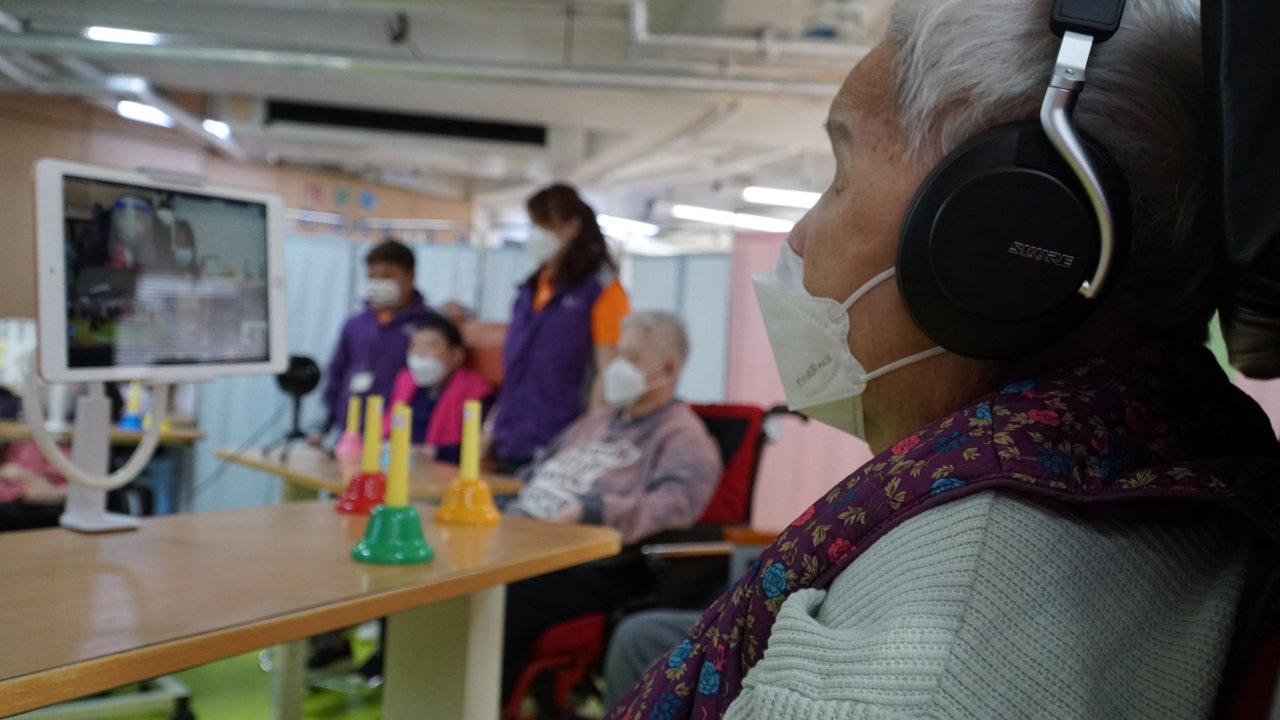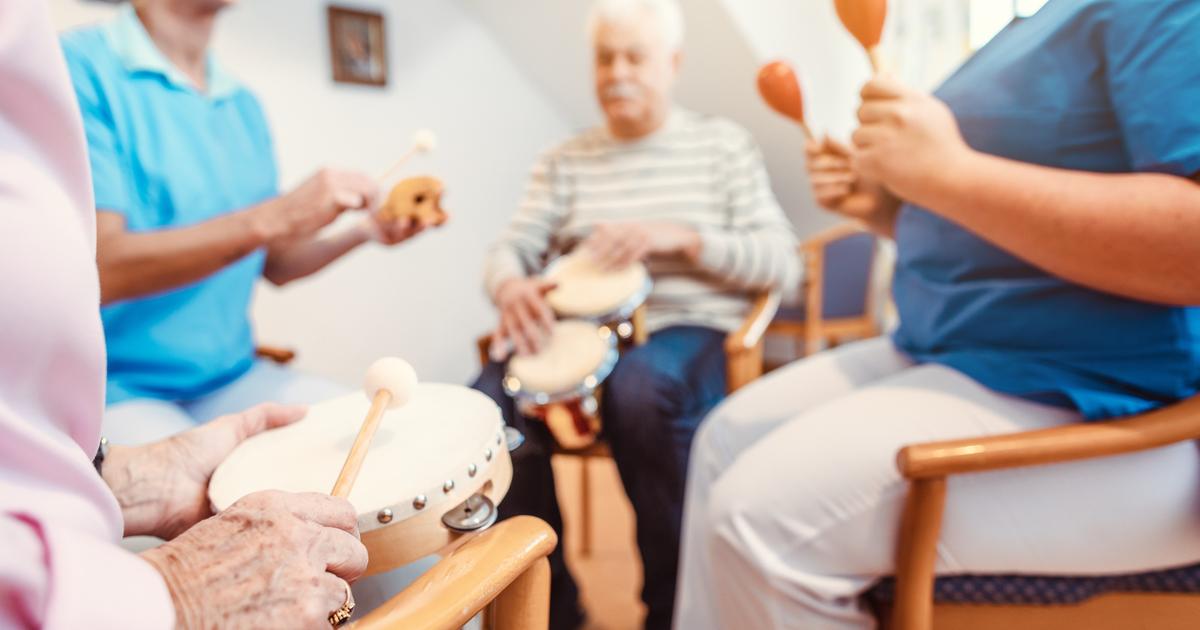The psychological condition of the elderly should be paid attention to.
According to the report of the World Health Organization in 2017, it was pointed out that more than one-fifth of the elderly in the world suffer from mental disorders, and female elderly are more likely to feel stress, anxiety and vulnerability, and the related situation is more serious for the visually impaired elderly. When dealing with issues related to the elderly, the Government seldom addresses the emotional needs of the elderly.
Under the impact of the epidemic, the visually impaired elders living in residential institutions are even more isolated from the world. They have not been able to see their family members for a long time, and their related emotions have not been relieved.
In the past two years, some organizations have conducted pilot clinical studies combining mindfulness and music therapy, and found that the combination of the two therapies can significantly improve the emotional regulation and depression index of a group of visually impaired elders.
The "Enjoy the Joyful" March for Ageing Project will be launched in 2020 by the Hong Kong Society for the Blind, Kowloon Home for the Blind Integrative Treatment Unit, and sponsored by HSBC Private Bank.
It is planned to conduct research on mindfulness-based music therapy combining mindfulness, music and gerontology. Through random allocation, 30 visually impaired elders will be arranged to participate in mindfulness-based music therapy for eight weeks.
(Photo by Zeng Fengting)
The "Enjoy the Joyful" March for Ageing Project will be launched in 2020 by the Hong Kong Society for the Blind Kowloon Residential Care Centre for the Elderly and sponsored by HSBC Private Bank.
It is planned to conduct a study on mindfulness-based music therapy combining mindfulness, music and gerontology. Through random allocation, 30 visually impaired elders will be arranged to participate in mindfulness-based music therapy, mindfulness therapy and no therapy for eight weeks respectively. for comparison.
Among them, mindfulness-based music therapy is created by young musicians through the online video format, and the visually impaired elderly in Kowloon Home for the Blind use different types of Cantonese songs and sounds to create an emotional situation for them, allowing participants to participate People learn to accept their negative feelings, and then improve their mood.
+1
Mindfulness-based music therapy effectively improves the emotional state of the elderly
The study found that the visually impaired elders who received mindfulness-based music therapy had significantly improved emotional regulation and emotional acceptance compared with other elders.
The research team also used the Geriatric Depression Scale to evaluate and found that the depression index of the elderly who did not receive any treatment was significantly worse.
On the other hand, the elderly who had mindfulness-based music therapy or mindfulness therapy intervention showed significant improvement, the former improved by 4 points, and the latter improved by 2 points.
One of the researchers, Chen Haoyun, who is now a senior lecturer at the School of Health and Social Welfare at the University of the West of England, said that although the more common mindfulness therapy is effective in reducing depression and anxiety, visually impaired people rely on auditory stimulation, and their visual ability is weaker. Mindfulness therapy may not be as effective as it should be.
The addition of musical elements can enhance their stimulation.
(Photo by Zeng Fengting)
Visually impaired elders need to add auditory elements to stimulate their senses
One of the researchers, Chen Haoyun, who is now a senior lecturer at the School of Health and Social Welfare at the University of the West of England, pointed out that there are foreign studies showing that mindfulness-based music therapy can help visually impaired children improve their mood, but it has not been performed on visually impaired elders. Related research.
He said that although the more common mindfulness therapy is effective in reducing depression and anxiety, the visually impaired people rely on auditory stimulation and their visual ability is weak. stimulus.
He mentioned that mindfulness-based music therapy can strengthen their senses, achieve a synergistic effect of soothing emotions, and help the visually impaired elders to explore and understand themselves and learn to accept their emotions.
Granny Cheng is one of the visually impaired elders who received mindfulness-based music therapy.
Grandma Cheng mentioned that her vision began to decline at the age of 13, and she later found out that it was due to optic atrophy. She gradually lost all her vision. She met her husband, who is also a visually impaired person, in the Association for the Blind. A few years ago, Granny Zheng's health deteriorated and she needed to be admitted to an institution for proper care. Before the epidemic, Granny Zheng's husband often visited the institution to visit her.
Husband is unable to enter the home to visit due to the epidemic, and his mood deteriorates
Under the epidemic, her husband was unable to enter the institution, and could only rely on a daily phone call to maintain contact. Without physical contact, Granny Zheng was unable to adapt and became depressed.
Later, I got the mindfulness-based music therapy from the staff of the institution, so I tried to participate. Later, I realized that the young musicians sang familiar songs and started to open their hearts to them.
At present, Granny Cheng regards her as a good friend, and she is most looking forward to the day of mindfulness-based music therapy every week.
She pointed out that among the many golden songs, "Walk With You" is her favorite.
Another visually impaired elder who received mindfulness-based music therapy is Granny Su. She said that under the epidemic, there were no programs in the home, and she also liked music very much, so she tried to participate.
Granny Su pointed out that listening to the familiar songs reminded her of happy memories in the past: "I was very poor and had no money. At night, I would go to Tanabe to pick up sweet potatoes that people didn't want. After that, we all had a good time together."
Before the epidemic, she often devotes herself to her best friends and vents, but under the epidemic, she rarely has the opportunity to chat with them, and her physical discomfort has also affected her emotions.
She believes that the breathing training in mindfulness-based music therapy can help restore calmness: "Do tight formations, don't contemplate."
Breathing training helps relieve emotions
Yang Qiong, director of the Kowloon Home for the Blind of the Hong Kong Society for the Blind, pointed out that due to the epidemic, the elderly in the home cannot go out, and their family members cannot come to visit, and they immediately lose the opportunity to contact the society.
In the midst of the fifth wave of the outbreak, the need for institutions to act as isolation facilities is even greater.
"The inmates will be very surprised, 'The next two will go to the isolation room?' At the same time, they have to face the situation that the inmates suddenly disappear at any time."
Yang Qiong said that many elderly people were unable to adapt to the situation. They only saw people entering and leaving the whole body wearing protective clothing, and some people were even less aware of what was going on. This made the atmosphere in the home more depressing for a long time, and the emotional state of the elderly was seriously aggravated during this period. Mindfulness-based music therapy Among them, part of it is breathing training, which can help them ease their emotions.
Yang Qiong, director of the Kowloon Home for the Blind of the Hong Kong Society for the Blind, pointed out that due to the epidemic, the elderly in the home cannot go out, and their family members cannot come to visit, and they immediately lose the opportunity to contact the society.
Some are even less aware of what happened, which made the atmosphere in the home more depressing for a long time, and the emotional state of the elderly was seriously intensified during this period.
(Photo by Zeng Fengting)
Social Enterprise Cheering Music Instructor Dai Jo is a musician who assists mindfulness-based music therapy.
He said that the plan not only provides music therapy to the elderly, but also establishes a relationship with them. "When they see the number 8 playing every day, they will care about us, like my grandson, but at the same time they get along like friends."
During his online video chat with Friends, he subverted his inherent imagination of the elderly, "Do you think they are conservative? In fact, they have a long history of madness, and their concept of love is very close to us."
Dai Jo mentioned that he learned simple contentment and happiness from it, "There is a mother-in-law whose husband is a boat, and we can see each other once in many months. When asked about their maintenance, it turns out that every time his husband goes to a place, he will buy the same thing as a gift. mother-in-law".
Cantonese songs are used in therapy
Ye Caixia, the founder of social enterprise Cheer Music, pointed out that in the past two years, the music tutor has served more than 50 friends and conducted nearly 300 mindfulness-based music therapy sessions. They enjoy music at events such as going to a concert, and radio and radio are their most commonly used media. Therefore, after collecting the preferences of the elders, they have selected more than 20 songs for therapy, hoping to enrich their residential life. .
The project leader and occupational therapist of the Hong Kong Society for the Blind, Zhao Dashen, said that the worst situation ever encountered is that the elderly are unable to distinguish whether they are happy or not. They have to face both physical decline and death. These will affect their emotional health.
(Photo by Zeng Fengting)
Occupational therapist: Worst can't tell whether the elderly are happy or not
The project leader and occupational therapist of the Hong Kong Society for the Blind, Zhao Dashen, described emotions as colorless water. The worst situation he encountered was that the elderly were unable to distinguish whether they were happy or not. They had to face both physical decline and physical decline. death, these can affect their emotional health.
However, in the past, the government paid little attention to the emotional needs of the elderly when dealing with the issues of the elderly. The intervention of mindfulness-based music therapy can help the elderly to improve these negative emotions and regain their peace. It can also be helped by various instruments. Under the control, you can know in real time whether the relevant therapy is effective, and make adjustments immediately.
Zhao Dashen mentioned that the funding for mindfulness-based music therapy will end in November this year, and he hopes to have the opportunity to continue related therapy to help more elderly people in the future.
Residential Homes︱The fifth wave of 52,000 residents infected with the disease, Kwai Tsing District, the highest number of residential care homes in 3 districts, the mortality rate reached 10% The first test for the handicapped: some elevators lack voice navigation and it is difficult to switch lines
01 Community












/cloudfront-eu-central-1.images.arcpublishing.com/prisa/KMEYMJKESBAZBE4MRBAM4TGHIQ.jpg)


